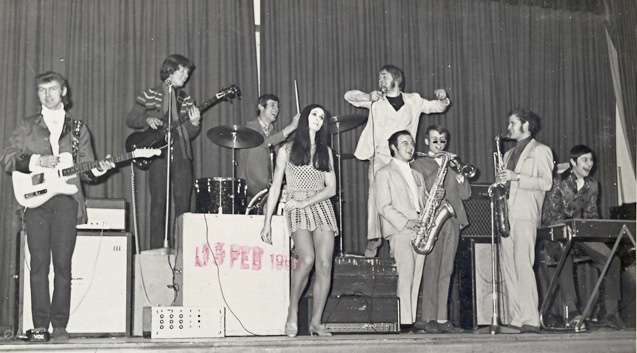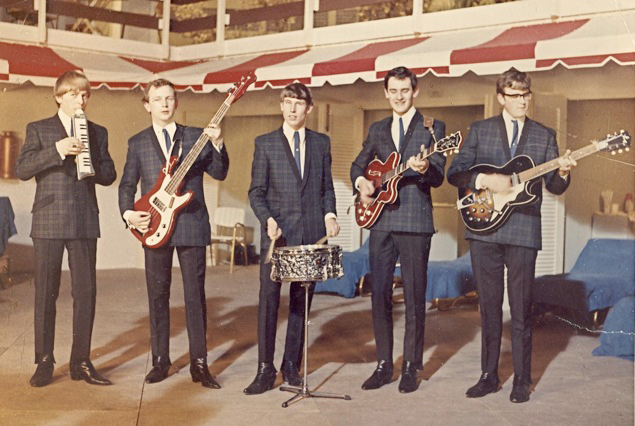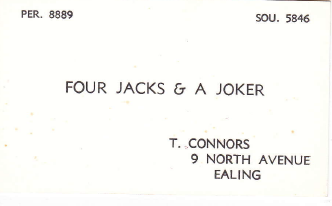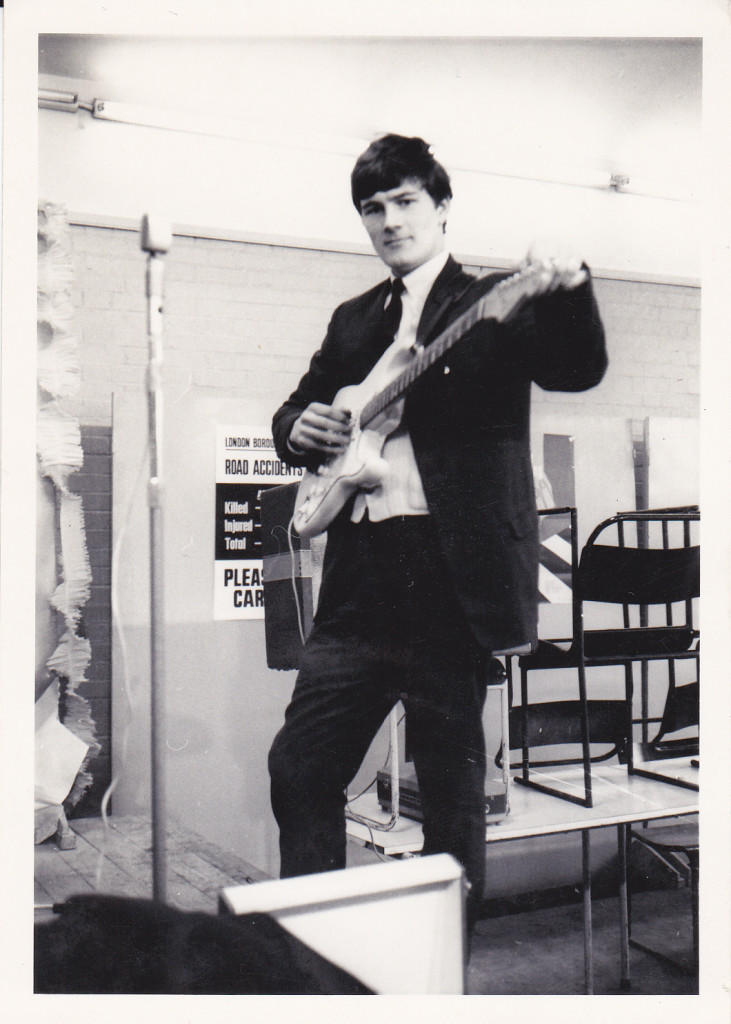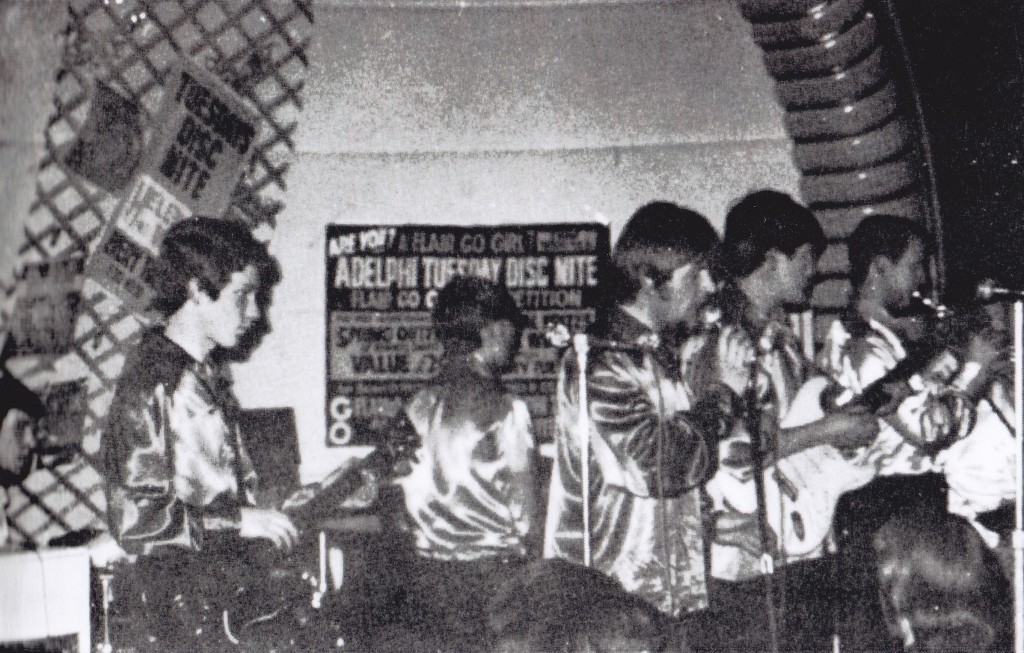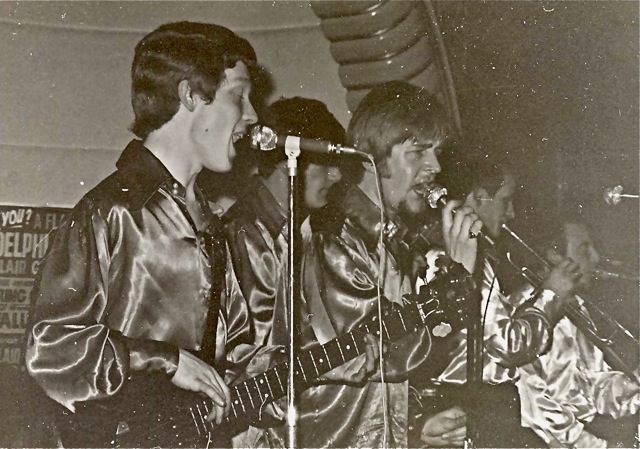By Nick Warburton
West London R&B/soul connoisseurs The Army have the distinction of being the group that spawned future Sweet bass player/singer Steve Priest.
The Army, February 1968 at The Grange Club in Hayes, left to right: Richard Herring, Steve Priest, Alan Bennett, Anita (go-go dancer), Richard Bennett, George Russell, Ron Lewingdon, John Barter and Dennis White (used with kind permission of Richard Bennett)
The Army’s roots can be traced as far back as 1960 when cousins Richard Bennett (lead vocals) and Alan Bennett (drums) decided to form their first band, The Satellites in Hayes, Middlesex.
Joined by Dave Harris (bass) and siblings Ian Orton (lead guitar) and Mick Orton (rhythm guitar), The Satellites had an early brush with fame when they appeared on the set of the James Bond movie Goldfinger in 1964.
The Satellites Left to right: Richard Bennett, Dave Harris, Alan Bennett, Ian Orton and Mick Orton. This photo was taken at the opening scene of Goldfinger (used with kind permission of Richard Bennett)
In June/July 1966, however, The Satellites underwent a significant reshuffle, starting with the addition of lead guitarist Tony Tacon, whose main claim to fame is that he had been a member of local rivals, The Javelins with future Deep Purple singer Ian Gillan during 1962-1964.
The Javelins (used with kind permission of Tony Tacon)
Shortly after Gillan left to join Wainwright’s Gentlemen (featuring future Sweet drummer Mick Tucker) in November 1964, Tacon joined Ealing band, Four Jacks and a Joker before hooking up with West Drayton outfit, The Ways & Means for a few months.
“I got a knock on my door from Clem who had been a part-time manager of The Javelins,” remembers Tacon. “He said that The Satellites were looking for a new lead guitarist if I was interested. I went down to Uxbridge for an audition and joined.”
Four Jacks & A Joker (used with kind permission of Tony Tacon)
With Dave Harris and Mick Orton out of the picture; Ian Orton changed from guitar to electric organ and stayed with the band as the band decided to remodel itself on Cliff Bennett & The Rebel Rousers with an added horn section.
“Steve Priest joined as our new bass player,” continues Tacon. “I remember us going around to see him at his parents’ house in Hayes. I was familiar with him from his Countdowns days but someone else in the band had made contact with him.”
For the proposed horn section, Tacon recommended his friend, sax player John Barter, who had played alongside the guitarist in Four Jacks and a Joker. Barter in turn introduced his friend, fellow sax player George Russell, a former member of Twickenham-based R&B outfit, Jeff Curtis & The Flames.
Renamed The Army, in view of the increased number of personnel in the band, Richard Bennett, who worked as a sign writer, painted the new moniker, surrounded by instruments, on the sextet’s new purchase, an old 30cwt van.
“The van was so big that we used to have to take it in turns to have it for a week and park it outside our homes,” says Tacon.
From the outset, The Army’s repertoire was entirely comprised of cover material, mixing popular US R&B/soul numbers like Lee Dorsey’s “Ride Your Pony”, The Four Tops’ “Reach Out, I’ll Be There”, Larry Williams’s “Slow Down” and Wilson Pickett and Steve Cropper’s “In the Midnight Hour” (which Steve Priest sang) with British classics, such as Zoot Money’s “Big Time Operator”.
At first, the revamped and renamed outfit found gigs at its local haunt – the Grange Club in Hayes. Interestingly, they were also invited to perform at several garden parties for the Tory party.
“I was impressed by the sort of gigs that we did,” recalls Tacon. “The band was well in with the Young Conservative Association, how I don’t know, and played at many of the functions in London and the Home Counties.”
During this time, the guitarist remembers the band landing a gig at the Queen’s Building in the centre of London (Heathrow) Airport and sharing the dressing room with Kenny Ball & His Jazzmen.
Tony Tacon (used with kind permission of Tony Tacon)
In late October, The Army played at a Halloween Party at a hotel opposite the airport, which was put on by a film producer.
More significant, the sextet started performing on London’s busy club scene, including shows at the Whisky A Go Go in Soho and the 100 Club on Oxford Street.
“One night we played a dance hall in the Amersham area… then went straight off to the centre of London where we played the 100 Club in the early hours of the morning. The Birds may have been on before us,” recalls Tacon.
“I remember that Steve [Priest] had some friends with him at that gig and one of them was robbed on the dance floor. My fiancée (now my wife) saw it happen and says that the gang turned Steve’s friend upside down to empty his pockets.”
As the band’s popularity grew, The Army ventured further afield, including shows in Cardiff, Dunstable, Birmingham and Nottingham among others.
Tacon remembers the sextet playing a converted warehouse in Birmingham [around late July/early August 1966] and John Mayall’s Bluesbreakers were in the dressing room when they arrived.
“I remember John Mayall sitting there smoking a spliff. The window at the end of the room looked out on to a large intersection and bang opposite was Digbeth police station,” continues the guitarist.
“We left our gear and all went off to the Bullring for something to eat, missing the Bluesbreakers’ set. I have often wondered if Eric Clapton was in the room that night, but after comparing notes with Steve Priest; he assures me that it was the first gig for Peter Green, who he saw frantically practising in readiness having just taken over from Clapton.”
Tacon adds that The Army played at the Dungeon Club in Nottingham the next evening, a venue that he recalls playing at least twice during his time with the band.
The Army at The Adelphi (from Steve Priest’s book ‘Are you ready Steve?’)
Another notable gig took place on Christmas Eve when The Army opened for their idols, Cliff Bennett & The Rebel Rousers at Burton’s in Uxbridge.
“I must have left in my own van earlier than the others after the gig because the next morning (Christmas Day), two of the band, probably Richard and Alan turned up with my share of the money,” recalls the guitarist.
“They were good lads in that band. I went all over the place with them and do not remember any upsets at all.”
During January 1967, Tacon introduced trumpet player Ron Lewingdon and The Army became a seven-piece act.
“He approached me about joining when he saw me driving the band’s van one day in the company car park,” explains the guitarist. “I was working in the tool room at the same company at the time. I put it to the others and he was in.”
With Lewingdon on-board, The Army played at the Adelphi Ballroom in Slough (18 March 1967) and Tacon’s old mate from The Javelins, Ian Gillan turned up and ended up taking photos of the group performing from the side of the stage (see photos).
“Ian came with me in my car to see the band for the first time,” continues the guitarist. “I had been going to see him in Episode Six, so he repaid the compliment. He was best man at my wedding later that year.”
However, not long after, Tony Tacon handed his notice. The guitarist was indeed engaged and got married soon after; it was time to hang up his rock ‘n’ roll boots. In fact, Tacon didn’t play in a band again until The Javelins reformed in the early 1990s to record a CD. He currently plays with Lincoln band, Something Else.
At The Adelphi Club in Slough Buckinghamshire, above the cinema. Left to right: Steve Priest, Richard Bennett on lead vocals, Tony Tacon, Ron Lewingdon and George Russell (used with kind permission of Richard Bennett)
The guitarist remembers that his last gig with The Army took place at the California Ballroom in Dunstable on 25 March 1967.
“There were three bands on that night,” he says looking back. “The Troggs were top of the bill and we shared the dressing room with them. I remember being impressed that they arrived in an Austin Princess and brought a portable black and white TV with them that was set up in the dressing room.”
With guitarist Richard Herring taking over on lead guitar and Dennis White joining on electric organ shortly afterwards, The Army cut two tracks that were shelved until 2014 when this author helped secure the release of the band’s cover of the Joe Tex hit, “Sugar” on Acid Jazz’s Rare Mod Volume 5. The band’s cover of the Sam & Dave hit “You Don’t Know Like I Know” remains unreleased.
The Army – You Don’t Know Like I Know
On 14 October, The Army returned to the California Ballroom to support Georgie Fame. Two months later, they played two shows at Burton’s in Uxbridge, the latter on New Year’s Eve, opening for Cliff Bennett & The Rebel Rousers.
The Army continued to gig during early 1968, playing venues like Walton Hop. However, behind the scenes, Steve Priest began rehearsing with The Sweetshop on the side.
“I was a fan of smaller bands like Cream,” says Priest on his decision to explore new avenues. “The Army and Wainwright’s Gentlemen played at Ealing Town Hall on the same night. Mick [Tucker] was fired that night and Brian [Connolly] resigned.”
In March 1968, the bass player announced his decision to leave The Army by playing his debut gig with The Sweetshop (subsequently shortened to The Sweet). Taking on a new bass player, The Army continued to gig, include a clutch of shows at the New Pink Flamingo in Soho, until mid-1969 when the musicians went their separate ways.
Alan Bennett and Ron Lewingdon stuck together. Reunited with former member, the late Ian Orton on rhythm guitar and lead vocals and siblings Ray Spiteri (lead guitar) and Bob Spiteri (bass), they formed The Occasions and landed a prestigious gig at the Hilton Hotel on Park Lane the early 1970s. Richard Bennett meanwhile later emigrated to Australia.
I would like to thank Tony Tacon, Richard Bennett, Alan Bennett, Ron Lewingdon, Steve Priest, John Kerrison and Keith Kendall for providing some information about this band. Thanks to Richard Bennett and Tony Tacon for providing images.
Copyright © Nick Warburton, 2015. All Rights Reserved. No part of this article may be reproduced or transmitted in any from or by any means, without prior permission from the author.
I have tried to ensure the accuracy of this article but I appreciate that there are likely to be errors and omissions. I would appreciate any feedback from anyone who can provide any additions or corrections. Email: Warchive@aol.com or nick_warburton@hotmail.com
Notable gigs:
24 December 1966 – Burton’s, Uxbridge, Middlesex with Cliff Bennett & The Rebel Rousers
18 March 1967 – Adelphi Ballroom, Slough, Berkshire
25 March 1967 – California Ballroom, Dunstable, Bedfordshire with The Troggs
1 April 1967 – Walton Hop, Walton-on-Thames, Surrey
23 April – Adelphi Ballroom, Slough, Berkshire
29 April 1967 – Tiles, London with Lemon Line and The Penny Blacks
11 May 1967 – Upper Cut, Forest Gate with The Jokers and The Afex
28 May 1967 – Adelphi Ballroom, Slough, Berkshire
15 July 1967 – Adelphi Ballroom, Slough, Berkshire
16 July 1967 – Carlton Ballroom, Slough, Berkshire
29 July 1967 – Tiles, London with The Gass and The Fraternity
19 August 1967 – Tiles, London with Coloured Raisins and Tiles Big Band
23 August 1967 – Town Hall Park, Hayes, Middlesex
2 September 1967 – Adelphi Ballroom, Slough, Berkshire
14 October 1967 – California Ballroom, Dunstable, Bedfordshire with Georgie Fame & Four Point Five
25 November 1967 – Clay Pigeon, Eastcote, Middlesex
26 November 1967 – Starlight Ballroom, Crawley, West Sussex
30 November 1967 – RAF Northwood, Hertfordshire
2 December 1967 – Burton’s, Uxbridge, Middlesex
3 December 1967 – Starlight Ballroom, Crawley, West Sussex with The Temptations
31 December 1967 – Burton’s, Uxbridge, Middlesex with Cliff Bennett & The Rebel Rousers
13 January 1968 – Walton Hop, Walton-on-Thames, Surrey
26 May 1968 – New Pink Flamingo, London
2 June 1968 – New Pink Flamingo, London with The All-Nite Workers (billed as Army Soul Show)
